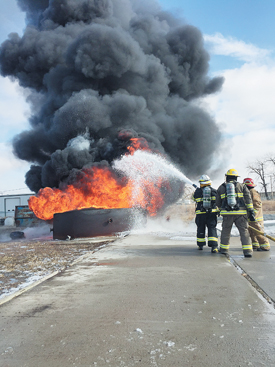Current Temperature
14.3°C
Committees to review no billing mutual aid fire service option
Posted on November 29, 2017 by Taber Times TIMES FILE PHOTO
TIMES FILE PHOTOBy Trevor Busch
Taber Times
tbusch@tabertimes.com
On the heels of a request by the Municipal District of Taber to consider a “no billing” Mutual Aid Fire Service Agreement between the municipalities’ respective departments, town council has referred the idea to two committees for review.
On Oct. 25, the town received a request from the M.D. of Taber asking for a review of the Mutual Aid Fire Service Agreement between the two municipalities to determine if the current agreement which requires billing for fire-related services might be amended to become a “no billing” agreement between both parties. The current Mutual Aid Agreement between the town and M.D. of Taber identifies billing between both parties at Ministry of Transportation rates. The ministry allows for billing on highways at a rate of $615 per hour on rescue units and fire engines with personnel, and $180 per hour on a command unit with personnel.
“Of course this was in the paper (Nov. 8 edition, “M.D. council discusses mutual aid fire agreement”) from M.D. last week, and they made a bit of an analogy with a garbage can fire, and four units would be rolling at $615 dollars an hour,” said Coun. Joe Strojwas during council’s Nov. 14 regular meeting. “I thought that was a little overkill on their part, that there would be a $6,000-$7,000 bill for that. I think this is an item that should probably be taken back to the Emergency Management Committee as well as Intermunicipal Development, because there’s a lot of other factors involved here. We’ve already been painted with a bad brush on that, in my opinion, and it’s just not true.”
Through the town’s Fire Services Bylaw 5-2016, the fire department currently has the ability to bill on any insurable fire or motor vehicle incident, and falls under the fee structure in Fee Bylaw 19-2016 at Ministry of Transportation rates.
According to administration, this allows both parties to recover equipment damage, personal wages and general department expenses over and above the regular operational budget, following the “common practice as in the Southern Alberta Resource Sharing Agreement.” As such “you are able to identify this on large incidents (where) crews are on scene for days.”
Fire chief Steve Munshaw indicated that the M.D. of Taber’s department was not currently a signatory of the Southern Alberta Resource Sharing Agreement. Responding to an inquiry from Coun. Garth Bekkering, Munshaw went on to confirm that no billing mutual aid agreements are by no means uncommon in Alberta.
“There’s no billing mutual aids, there’s billing mutual aids. They vary quite dramatically.”
Highlighted in bold in council’s Request for Decision, administration also asserted that “the ability to recover costs on insured incidents supports the department’s operational budget without affecting the ratepayer.”
“I think at this time we can’t make a decision in this, because it does impact our taxes,” said Strojwas. “If Lamb-Weston were to catch fire and we sent a unit out there for three or four days, and the town would then have to pick up the cost on that, or is that an insurance practice and we’re not going to get it back? These are the type of things we need to sit back and justify in our deliberations on a go-forward basis. It could certainly impact the fire budget by thousands of dollars for sure.”
Weighing the financial implications, administration also argued that while the agreement would give guidance on costs when requesting mutual aid and help to track costs during an emergency response, if council chooses to sign a no charge mutual aid agreement “this will have an effect on the operational budget of the fire department” that would be “determined by the number of times we are called out.”
The Taber Fire Department currently bills for all insurable fire calls within the Town of Taber’s boundaries “offsetting the operational budget for calls that require large wage amounts and/or equipment costs.”
The average unit response cost per hour, which includes mainly wages and equipment, is $300-$450 per hour, excepting any equipment failure which would increase costs.
“By not offsetting the operational budget with this billing, the operational budget would need to be increased,” stated administration in a written document included as part of the information package.
Following discussion, council voted unanimously to employ the members of the Intermunicipal Development Committee and the Emergency Management Committee to discuss the opportunities around fire hall responses and billing.
Leave a Reply
You must be logged in to post a comment.

